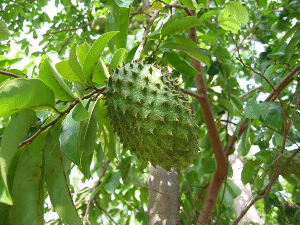


IMPORTANT: The information provided is for information only. The medical claims or advice are not endorsed. Never take any medicines without first consulting a qualified practitioner.

Soursop (Annona muricata) is more than a refreshing fruit in Jamaica—it’s a staple in the island’s natural pharmacy. Known by names like graviola and guanabana in other parts of the world, soursop has earned its place in bush medicine for generations, especially through the calming powers of its leaves. In Jamaica and the Antilles, it’s as likely to be steeped in tea as it is slipped into a pillowcase to ease the nerves and bring restful sleep.
The leaves are widely used for calming anxiety, lowering high blood pressure, treating colds and fevers, and supporting digestion. In folk tradition, placing fresh leaves inside bedding or drinking a cup of the bitter tea before bed is said to ensure a peaceful night. Mashed leaves are also applied directly to skin to soothe inflammation, heal sores, and treat wounds. And in a curious bit of bush wisdom—rubbing the head with leaves and water is said to help sober up a drunk.
The fruit, large and heart-shaped, weighs up to 6.8 kilograms. It has a green leathery skin covered in soft, stubby spines that break off when ripe. Inside lies a white, creamy pulp with a faint pineapple aroma and up to 200 shiny black seeds—slightly toxic if chewed. The flesh is eaten raw or blended into juices, ice cream, or smoothies. A fermented version yields a cider-like drink, while even the unripe fruit can be boiled and eaten as a vegetable.
Beyond its culinary value, soursop is used domestically as a natural pesticide. A mix of boiled leaves, pounded seeds, or seed oil is applied to kill lice and bedbugs. The bark, seeds, and roots—used with caution—have served as fish poison and insect deterrents for generations.
In recent years, interest in soursop has surged due to claims that compounds in its leaves and seeds—especially acetogenins—may target certain cancer cells while sparing healthy ones. Preliminary lab research shows promise, but human trials are lacking, and health experts warn against substituting it for conventional treatment. Other studies suggest antiviral potential, though again, findings remain inconclusive.
Traditional Uses: Sedative, nerve tonic, blood pressure support, fever and cold relief, digestive aid, skin healing, insect repellent, lice treatment
Common Preparations:
– Leaf tea: Boiled from fresh or dried leaves, taken hot or cooled
– Pulp: Eaten raw or juiced
– Topical: Mashed leaves applied to wounds; decoctions for lice or insects
– Fermented: Occasionally made into a mild alcoholic beverage
Note of Caution: Soursop seeds and bark contain low levels of toxic alkaloids and should not be consumed directly. High doses or long-term use of extracts may affect nerve health. Pregnant women and those with neurological conditions should consult a qualified practitioner.
Soursop fruit is not just appreciated for its flavor but also its nutritional benefits. The pulp is an excellent source of vitamin C, providing significant antioxidant support, as well as dietary fiber, which promotes digestive health. Soursop also contains potassium and small amounts of B vitamins (especially thiamine, riboflavin, and niacin), calcium, and magnesium, contributing to hydration and overall well-being.
Important recent research links prolonged or frequent consumption of soursop—particularly its seeds, leaves, and teas—to an increased risk of atypical forms of parkinsonism in some Caribbean regions (notably Guadeloupe). The compound primarily implicated is annonacin, a type of acetogenin found abundantly in the seeds and leaves. High intake, or chronic use, may harm nerve cells and is not recommended.
Annonacin is a natural chemical found in soursop and other related plants. It belongs to a group of compounds called acetogenins. While annonacin is studied for its potential effects on cells (which is why you might hear about it in cancer research), it’s important to know that too much can be harmful—especially to nerve cells. High levels of annonacin, especially from eating large amounts of soursop seeds or drinking strong soursop leaf tea over a long time, have been linked to problems with the nervous system, including symptoms similar to Parkinson’s disease.
In plain terms: Annonacin is one of the main natural substances in soursop that can hurt the brain and nerves if you get too much of it. That’s why experts advise not eating soursop seeds, being careful with strong teas, and using soursop products in moderation.
Soursop may enhance the effects of certain medications, including antihypertensive (blood pressure–lowering) and antidiabetic drugs, by naturally lowering blood pressure and blood sugar. Individuals taking prescription medication for these conditions should seek medical advice before using soursop products, as additive effects could lead to adverse outcomes.
Clinical Evidence Disclaimer:Many health claims—in particular, anti-cancer and antiviral effects—are based on laboratory or animal studies. There are currently no well-conducted human clinical trials supporting the safe or effective use of soursop for the prevention or treatment of cancer or viral illnesses.